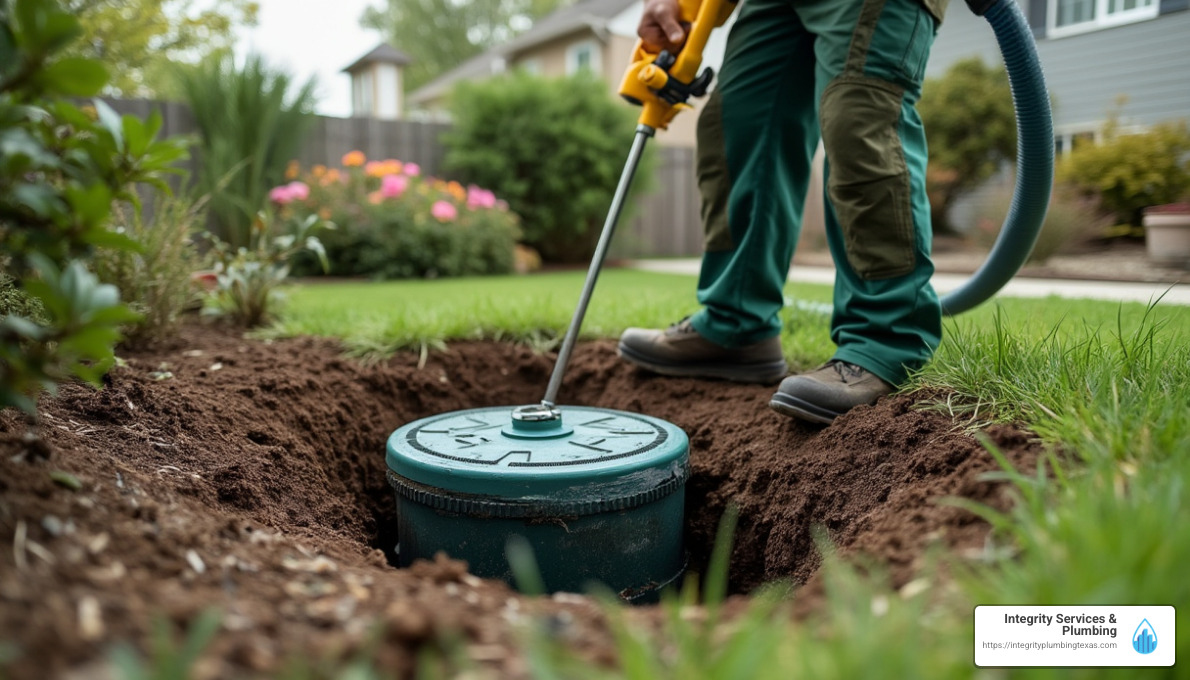Septic Tank Pumping Service: Top 5 Essential Tips 2025
Septic tank pumping service is essential for maintaining healthy septic systems in both residential and commercial properties. If you’re wondering why this service matters, here’s the quick answer: Regular pumping prevents blockages, sewage backups, and costly repairs.
Key Benefits:
- Prevents Overflows: Avoid unpleasant overflows by maintaining a schedule.
- Extends System Life: Regular service keeps your septic system in top-notch condition, saving money on replacements.
- Improves Efficiency: Ensures smooth, odor-free operation, which is crucial for both homes and businesses.
Septic systems are crucial for places without city sewer connections, handling all wastewater efficiently. Whether you own a home or a business, keep this system in good shape.
Understanding the Basics:
These systems work by separating solid waste (sludge) from the liquids (scum), and it’s typical for these solids to build up over time. Without scheduled pumping, this buildup can lead to major headaches like clogs or even complete system failure.
“Early intervention can prevent further damage,” says a satisfied customer from one of our trusted providers, highlighting the importance of timely maintenance.
Consider adding septic tank pumping to your routine property management plan. This service not only addresses residential and commercial needs but ensures peace of mind by focusing on reliability and efficiency.

Understanding Septic Tank Pumping Service
Septic tank pumping is a vital part of maintaining a healthy septic system, whether you’re managing a residential or commercial property. Regular pumping is crucial because it prevents blockages, sewage backups, and costly repairs.
The Basics of Septic Tank Pumping
Septic systems handle wastewater for properties not connected to city sewers. These systems separate solid waste, known as sludge, from liquids, called scum. Over time, sludge accumulates at the bottom of the tank. If not removed, this buildup can cause clogs and even lead to system failure.
Regular Pumping: Most tanks need pumping every 3-5 years. This schedule can vary based on the size of your tank and the number of people in your household or business.
Cost: Pumping usually costs between $300 and $600, a small price compared to potential repair costs, which can range from $1,000 to $10,000 for major issues.
Why Regular Pumping Matters
-
Prevents Overflows: A full tank can overflow, causing unpleasant and unsanitary conditions.
-
Extends System Life: Regular maintenance helps prolong the life of your septic system, saving money on replacements.
-
Improves Efficiency: Ensures your system runs smoothly, without odors, which is important for comfort and health.

Sewage Smell
A persistent sewage smell around your home or yard is a serious warning sign. This odor can indicate that your septic tank is full and waste is not being properly contained. Ignoring this smell can lead to health risks and property damage.
Recognizing these signs early helps you avoid bigger problems and maintain the health of your septic system. If you notice any of these issues, it’s crucial to contact a professional for an inspection and possible pumping.
Next, let’s explore some frequently asked questions about septic tank pumping service, including costs and how often you should pump your tank.
Frequently Asked Questions about Septic Tank Pumping Service
How much does it cost to pump a septic tank?
The cost of septic tank pumping service can vary depending on several factors, such as location, tank size, and the company’s rates. Generally, you can expect to pay between $200 and $500. According to research, the average cost typically falls within this range, but prices might be higher in some areas due to additional travel charges or special services.
How often should a septic tank be pumped?
Regular maintenance is key to a healthy septic system. Most household systems should be pumped every three to five years. However, this can vary based on the size of your household and water usage habits. Larger families with higher water usage may need more frequent pumping. Alternative systems, like those with advanced treatment units, might have different maintenance schedules, so follow the manufacturer’s recommendations.
What happens to waste from a septic tank?
Once your septic tank is pumped, the waste (known as effluent) is carefully transported to a treatment facility. Here, it’s processed to remove contaminants before the treated water is safely discharged.
The remaining solid waste, or sludge, is often treated separately. In your septic system, liquid waste flows from the tank to a leach field or drainfield. This area allows effluent to percolate into the soil, where natural processes break it down further. Properly functioning drainfields are crucial for preventing environmental contamination and ensuring your septic system works efficiently.
Understanding these aspects of septic tank pumping helps you make informed decisions about maintaining your system. In the next section, we’ll conclude with the value of regular maintenance and the benefits of choosing Integrity Services & Plumbing for your septic needs.
Conclusion
Regular maintenance is vital for maintaining the health and efficiency of your septic system. It not only prevents costly repairs but also improves your property’s value. Plumbing experts highlight that a well-maintained system can contribute significantly to the overall worth of your home, accounting for about 15% of its value. Regular inspections and timely septic tank pumping service are essential to keep everything running smoothly.
Integrity Services & Plumbing is committed to providing top-notch septic solutions. As a family-owned business in the Rio Grande Valley, they understand the importance of reliable service and customer satisfaction. Their team offers expert residential and commercial plumbing solutions, ensuring your septic system remains in optimal condition.
Choosing Integrity Services & Plumbing means choosing peace of mind and quality service. Their experienced professionals are ready to assist with all your septic needs, from routine maintenance to emergency services. With their help, you can prolong the life of your septic system and protect your investment.
For more information on their comprehensive services, visit the Integrity Services & Plumbing service page.

